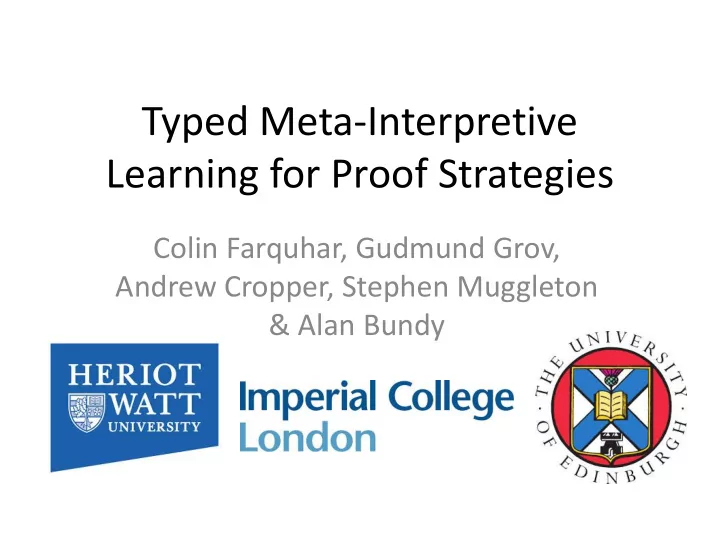

Typed Meta-Interpretive Learning for Proof Strategies Colin Farquhar, Gudmund Grov, Andrew Cropper, Stephen Muggleton & Alan Bundy
Motivation • Use of theorem proving software increasingly widespread in industry • Manual intervention often required; time- consuming and requires a skilled user • “Stuck” proofs often cluster into groups which can be addressed using the same strategy
Motivation • We demonstrate that meta-interpretive learning (MIL) can be used to learn these strategies in order to re-apply them elsewhere • These strategies have a high degree of branching and thus a large search space • We introduce typed MIL and hypothesise: “Typed MIL learns more deterministic proof strategies than untyped MIL”
PSGraph • Graphical representation of proof strategies [2] • Nodes represent tactics, predicates on wires direct goals between nodes and ensure An example PSGraph with edges labelled by predicates correctness
Metagol • We use the Metagol [3] implementation of MIL • Encode tactics and goal data as background information • Successful proof evaluations given as positive examples • Metarules applied to background to find a definition which satisfies examples
Metagol • Metagol allows predicate invention , i.e. missing definitions can be found using available background information • We can use this to find wire predicate definitions: strategy(A,B) :- strategy_1(A), tactic(A,B). strategy_1(A) :- has_symbol(A,C).
Metagol • Two separate learning problems: structure and conditions • To learn both we must either restrict wire predicates or learn a strategy with a high degree of branching • To resolve this we introduce typed MIL
Typed MIL • All predicates and arguments are “tagged” with a constant representing their type: P(X,Y) P:t 1 (X:t 2 ,Y:t 3 ). • To work in Metagol we treat the predicate type as an extra argument: P:t 1 (X,Y) P(t 1 ,X,Y).
An Example Strategy (A B) (B C) A C PSGraph Proof Tree
Learned Definitions Untyped Strategy strat_i(A,B) :- erule_impE(A,C),assumption(C,B). strat_i(A,B) :- erule_impE(A,C),strat_i(C,B). strat_i(A,B) :- rule_impI(A,C),strat_i(C,B). Typed Strategy strat_i(psgraph,A,B) :- assm_type(wpred,A),assumption(tactic,A,B). strat_i(psgraph,A,B) :- strat_i_1(psgraph,A,C),strat_i(psgraph,C,B). strat_i_1(psgraph,A,B) :- impE_type(wpred,A),erule_impE(tactic,A,B). strat_i_1(psgraph,A,B) :- impI_type(wpred,A),rule_impI(tactic,A,B).
Results • Learned strategies from 15 propositional logic proofs • Metagol run for 1, 2, 4 and 8 seconds Successes Mean Mean Mean Mean nodes clauses branches evaluations Untyped 13 4 3 9 1 Typed 7 4 4 1 2 Average learning results across all experiments
Results • Consider branching 10 9 factor σ for each 8 7 Mean branching Branching factor strategy. (UT) 6 Mean branching 5 (T) • Large σ indicates large 4 Optimum mean branching 3 search space 2 1 • Untyped: σ > 1 and 0 1 2 4 8 Time (s) increases Mean branching factor of strategies learned • Typed: σ = 1 and using untyped (UT) and typed (T) MIL compared to the optimum branching factor constant
Conclusions • Typed strategies have less branching than untyped strategies • Thus typed strategies are more deterministic • Initial results using this approach have been very promising
Further Work • Developing strategies from multiple proofs – already underway. Will use examples from group theory. • Moving on to larger, more complex proofs, e.g. rippling [1]. A simplified version can be learned with untyped MIL, can we learn a full version with types?
References [1] A. Bundy, Rippling: meta-level guidance for mathematical reasoning, Vol. 56. Cambridge University Press, 2005. [2] G. Grov, A. Kissinger and Y. Lin, A graphical language for proof strategies , in LPAR , volum 8312 of LNCS , pages 324-339. Springer, 2013 [3] D. Lin, E. Dechter, K. Ellis, J. B. Tenenbaum and S. H. Muggleton, Bias reformation for one-shot function induction , in ECAI , pages 525-530, 2014 This work has been supported by EPSRC grant EP/J001058/1 and the first author is supported by a James Watt scholarship. The fourth author acknowledges support from his Royal Academy of Engineering/Syngenta Research Chair
Recommend
More recommend